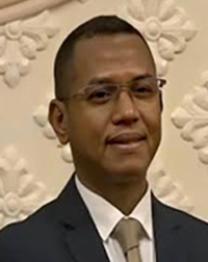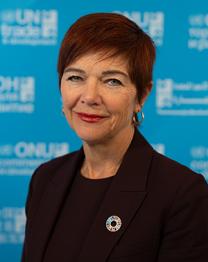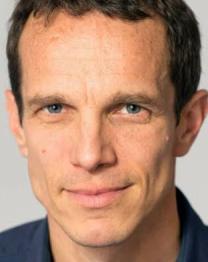
A new global effort to unlock the potential of seaweed for people and the planet was launched yesterday at the UN Headquarters during the 80th session of the General Assembly. The United Nations Global Seaweed Initiative (UNGSI) brings together governments, UN agencies, research institutions, civil society and industry to advance sustainable seaweed development.
With Madagascar, France and Indonesia as founding members and Madagascar and France serving as co-chairs, the Initiative welcomed Chile as a new partner and received encouraging signals of support from Brazil. Speaking at the launch, Madagascar’s Minister of Fisheries and the Blue Economy, H.E. Paubert Mahatante, stressed the importance of advancing seaweed through science, policy and funding, thanking UN partners and the Global Seaweed Coalition for their support.
Indonesia described seaweed as “a catalyst for millions who depend on the sea.” Chile emphasized that “today the journey starts - UNOC4 will be a key milestone of achievements.” Brazil pointed to its national acceleration plan and noted: “In Brazil we have two million fishermen - millions more around the world - who are among the people most vulnerable to climate change.”
From UNCTAD, Chantal Line Carpentier described the UNGSI as “a new chapter in the UN’s work – bringing seaweed front and center in global frameworks on sustainability, climate, and trade, and in doing so, advancing the SDGs, particularly through more sustainable food systems and inclusive development.”
Other UNGSI’s Partners also emphasised their commitment to supporting the sector. UNIDO pointed to the role of the private sector as a driver of innovation and investment, underlining the need for public support to enable growth. The UN Global Compact called for sustainable approaches and warned against replicating the pitfalls of terrestrial agriculture, such as monoculture. The Global Seaweed Coalition pledged to mobilise its international community to advance funding, science, advocacy and policy.
Seaweed is increasingly recognised as a resource that can address climate, environmental and socio-economic challenges all at once. It can absorb carbon, restore marine ecosystems, provide alternatives to fossil-based plastics, fertilizers, and expand sustainable food supplies. For coastal communities - especially women and small-scale producers - seaweed cultivation also means jobs, resilience and new opportunities.
The sector has grown rapidly, tripling in size over the last two decades, but global governance has not kept pace. UNGSI aims to close this gap by setting common standards that reflect national and regional context, supporting research and innovation, and mobilising investment.
It will also play a role in providing scientific, management and sustainable use advice, as well as capacity-building, for seaweed species found in areas beyond national jurisdiction under the framework of the soon-to-enter-into-force United Nations BBNJ Agreement. Its aim is to ensure that seaweed development supports both people and the planet, while advancing the Paris Agreement and the Sustainable Development Goals, with momentum building toward COP30 in Brazil.
Livestream link
Background
Seaweed offers a wide range of benefits for people and the planet. It contributes to food and nutrition security, provides opportunities for value addition and diversification into non-food sectors, enhances ecosystem services, and supports livelihoods for millions of small-scale producers - especially coastal communities and women. Its applications span food, feed, fertiliser additives, nutraceuticals, cosmetics, pharmaceuticals, textiles and, if commercial barriers can be overcome, even biofuels. Seaweed biomass also offers biodegradable and compostable alternatives to fossil-based plastics. Because cultivation is not land-intensive, it can act as a regenerative tool for ecosystems.
Over the past two decades, the global seaweed sector has tripled in size and doubled in value, reaching more than 35 million tonnes (wet weight) in 2022. Today, seaweed represents half of marine aquaculture production by volume, with exports valued at US$1.2 billion. Yet despite this growth, the sector remains under-supported and lacks the coordination, standards and dedicated governance needed to fully deliver on its potential and contribute to the SDGs. At the 3rd UN Ocean Conference (UNOC-3), the United Nations Global Seaweed Initiative (UNGSI) was announced by Madagascar, Indonesia and France, with support from UNCTAD, UN Global Compact-the Global Seaweed Coalition, FAO, UNIDO and UNESCO-IOC, alongside private sector, scientific and civil society partners following a recommendation from the 5th United Nations Ocean Forum. This UNGA80 side event serves as the official launch of UNGSI, bridging the UNOC-3 announcement and activities on the road to COP30 (Brazil). It will foster partnership, strengthen policy coordination, align scientific efforts, build technical capacity and advocate for sustainable finance for the seaweed sector.
Tentative Agenda
Welcoming remarks
- H.E. Paubert Tsimanaoraty Mahatante, Minister of Fisheries and Blue Economy, Madagascar
Opening keynotes by founding member states
- HE Paubert Tsimanaoraty Mahatante, Minister of Fisheries and Blue Economy, Madagascar
- Mr. Tri Tharyat, Director General of Multilateral Cooperation, Ministry of Foreign Affairs, Republic of Indonesia or Mr. Leonardo Adypurnama Sambodo – Deputy for Food, Natural Resources, and Environment, Ministry of National Development Planning/BAPPENAS Indonesia
Statements by supporting Members
- Ms. Patsy Contardo, Ocean Affairs Legal advisor, Ministry of Foreign Affairs, Chile
- Ms. Marinez Scherer, Special Envoy for the Oceans, Brazil
Statements by supporting partners:
- Ms. Chantal Line Carpentier, Head, Trade, Environment, Climate Change and Sustainable Development, UN Trade & Development
- Mr. Akos Koszegvary, Chief of Public Private Partnership, UNIDO
- Mr. Vincent Doumeizel, Senior Advisor, Ocean and Food, UN Global Compact
- Ms. Nichola Dyer, Senior Advisor, Global Seaweed Coalition
Interventions by interested member states
Additional interventions from the floor
Official launch of Initiative & logo
Closing
Official photo

Mahatante Tsimanaoraty Paubert, currently Minister of Fisheries and Blue Economy of Madagascar since August 2021. Paubert is a marine biologist and oceanographer with 16 years of experience in the field of fisheries, aquaculture and marine ecosystems. He is an Associate Professor and full-time lecturer at the University of Toliara, Madagascar, for 7 years.
Paubert is also a founding member of several organizations in Africa, including SWIOTUNA, EARFISH, SANSAFA/SADC, and WIOGEN. He is an alumnus of the Fisheries and Marine Sciences Institute of the University of TOLIARA, the University of California Davis, the African Leadership Center, the Open Society Initiative for the Southern Africa and the Young African Leaders Initiative.
Paubert is the author of dozens of articles on fisheries, aquaculture and Blue Economy in general. As a public speaker and blue economy expert, he aims to make fish farming a similar activity to poultry farming in Madagascar and throughout the SADC Region, where every household practices it, mainly in rural areas, in order to contribute to food security, job creation, and poverty reduction.
The fight against IUU fishing and the transformation of the fishing sector in sub-Saharan Africa are among its main priorities. This, with the aim of strengthening the resilience of the community.

Dr. Carpentier, from Quebec, Canada, is Head of Trade, Environment, Climate change, and Sustainable Development Branch of UNCTAD’s Division on International Trade and Commodities (DTIC). Her work with governments and partners foster green, blue, circular, and impact economies that supported by trade, are key to addressing the triple planetary crisis: climate change, pollution and biodiversity loss. She came to Geneva after leading the UNCTAD New York office, representing the SG and coordinating UNCTAD’s support to inter-governmental negotiations of the UN General Assembly (2015-2023).
She held several other positions. At the UN Department of Economic and Social Affairs, she facilitated the engagement of NGOs, women and youth’s groups, business, local authorities, etc. in the SDGs negotiations and the UN Rio+20 Conference (2011-2015). She also supported the Commission on Sustainable Development research and negotiations on sustainable agriculture and sustainable consumption and production (2007-2011).
Prior to joining the UN, she Headed the North American Free Trade Agreement Commission for Environmental Cooperation’s, Environment, Economy and Trade Division (2000-2007), was Agro-environmental policy analyst for Winrock International (1998-2000) and post-Doctoral fellow/Brazil office manager for the International Food Policy Research Institute (1996-1998).
She has a PhD. in Agro-Environmental Economics from Virginia Tech, as well as a MSc. and BSc. in Agro- Economics from McGill University and is an ironman and ultramarathoner. She is a Yale World Fellow, received the 2023 Schwab Foundation for Social Entrepreneurship public intrapreneur award, and is a UNEP Who’s Who of Women and the Environment.
Vincent Doumeizel is Senior Adviser on the oceans to the United Nations Global Compact as well as director of the Food Programme at the Lloyd’s Register Foundation.
A self-described optimist and global citizen, Vincent has in recent years devoted himself to promoting a food revolution and environmental solutions based on sea resources, especially seaweed. Vincent leads the charitable objectives of the Foundation through the funding of innovative projects to drive safety in the food supply chain.
Partnering with the UN, FAO, World Bank, WWF, universities, NGOs and large brands, Vincent released the “Seaweed Manifesto” and now co-leads the Global Seaweed Coalition with the objective to scale up the seaweed industry safely in order to address some of the world’s most important challenges, such as hunger, global warming, pollution and poverty.
Nichola Dyer, Senior Advisor to the Global Seaweed Coalition, brings experience across multilateral institutions and the public, private, academic, and non-profit sectors to her sustainability work.
She has designed and led strategic global initiatives across a wide range of sectors and themes, including seaweed and aquaculture, food systems and food security, governance, and engagement of marginalized and vulnerable groups. Currently, she serves on the Advisory Board of GlobalSeaweed-SUPERSTAR and several other non-profits and chairs an education grant program for women from developing countries.
During 26 years of World Bank Group service, Nichola managed the $1.5b Global Agriculture and Food Security Program, developed greenfield operational engagements on excluded minorities and disability, led the ethics office, and established the Gabon office.
She obtained her MSc in Economics at the University of Illinois at Urbana-Champaign.




